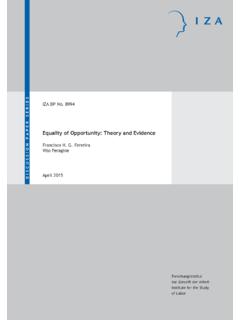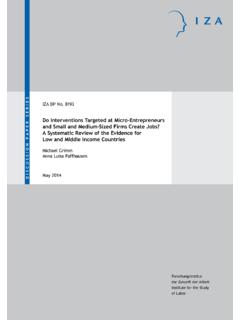Transcription of Entrepreneurship and Economic Development: Theory ...
1 discussion paper SERIESF orschungsinstitut zur Zukunft der ArbeitInstitute for the Study of Labor Entrepreneurship and Economic Development: Theory , Evidence and PolicyIZA DP No. 7507 July 2013 Wim Naud Entrepreneurship and Economic development : Theory , Evidence and Policy Wim Naud UNU-MERIT and MGSoG, University of Maastricht, MsM and IZA discussion paper No. 75 07 July 2013 IZA Box 7240 53072 Bonn Germany Phone: +49-228-3894-0 Fax: +49-228-3894-180 E-mail: Any opinions expressed here are those of the author(s) and not those of IZA. Research published in this series may include views on policy, but the institute itself takes no institutional policy positions.
2 The IZA research network is committed to the IZA Guiding Principles of Research Integrity. The Institute for the Study of Labor (IZA) in Bonn is a local and virtual international research center and a place of communication between science, politics and business. IZA is an independent nonprofit organization supported by Deutsche Post Foundation. The center is associated with the University of Bonn and offers a stimulating research environment through its international network, workshops and conferences, data service, project support, research visits and doctoral program. IZA engages in (i) original and internationally competitive research in all fields of labor economics, (ii) development of policy concepts, and (iii) dissemination of research results and concepts to the interested public.
3 IZA discussion Papers often represent preliminary work and are circulated to encourage discussion . Citation of such a paper should account for its provisional character. A revised version may be available directly from the author. IZA discussion paper No. 7507 July 2013 ABSTRACT Entrepreneurship and Economic development : Theory , Evidence and Policy* This paper provides an overview of the state of the art of the intersection of development economics and Entrepreneurship . Given the relative neglect of Entrepreneurship by development scholars it deals with (i) recent theoretical insights from the intersection of Entrepreneurship and development studies; (ii) the empirical evidence on the relationship between Entrepreneurship and development ; and (iii) fresh insights for Entrepreneurship policy for development that emerges from recent advanced in this area, including female Entrepreneurship in developing countries.
4 JEL Classification: M13, O10, O17, O40 Keywords: Entrepreneurship , development , small business, private sector development , innovation, business Corresponding author: Wim Naud Maastricht School of Management Box 616 6200 MD Maastricht The Netherlands E-mail: * A version of this paper is forthcoming as Chapter 17 of Currie-Alder, Bruce, Ravi Kanbur, David M. Malone, and Rohinton Medhora, eds. 2014. International development , Ideas, Experience, and Prospects. Oxford: Oxford University Press. 1. Introduction Adam Smith, founding father of modern economics detested business men (Lewis 1988: 35).
5 development scholars and development economists in particular have, if not detesting business men or entrepreneurs, (benignly) neglected them. Following Leff (1979: 51) many development scholars took the position that Entrepreneurship is no longer a problem or a relevant constraint on the pace of development in developing countries. Entrepreneurship scholars on other hand have been more concerned with the who, why and how of Entrepreneurship rather than with the impact of Entrepreneurship on development or developing countries (Bruton et al. 2008; Shane 1997); a state of affairs described as a scholarly disconnect (Audretsch et al.)
6 2007). Why does this matter? First, it is widely believed that Entrepreneurship is beneficial for Economic growth and development . Second, Entrepreneurship has been remarkably resurgent over the past three decades in countries that achieved substantial poverty reduction, such as in China. Third, donors and international development agencies have turned to Entrepreneurship to improve the effectiveness and sustainability of aid. However, the theoretical and empirical cases for understanding the role of Entrepreneurship are not yet solid. Evidence on whether Entrepreneurship matters for Economic growth is not straightforward; how Entrepreneurship has been promoted and how it contributed to development in countries like China and the East Asian Tigers is still a matter of contention; and whether and why private-sector development initiatives may be effective is not well understood (see also Naud , 2010a).
7 Closer scrutiny of the relationship between Entrepreneurship and Economic development is therefore needed. In order to stimulate the development - Entrepreneurship discourse it may be necessary to first attempt to formalize or reconcile the role of Entrepreneurship in the grand ideas of development economics, and to consider how this resonates with available evidence, and what this means for policy. There are at least three grand ideas in development economics. The first is that development requires a structural transformation of what, how and where production and consumption takes place: from low-value added, low productivity and rural-based activities to more productive, higher value added activities in services and manufacturing located in cities.
8 The second idea is that development is a multi-dimensional concept that requires more than just the eradication of income poverty. The third is the idea that market failures are prevalent and that the state has an important coordinating and regulatory role to play in development . All of these grand ideas are currently at the forefront of thought in development , and much of what development scholars are occupying themselves with either directly or indirectly resort under the umbrellas of these ideas. Accordingly this paper provides an overview of the state of the art in terms of development and Entrepreneurship . It is concerned with the theoretical insights from the intersection of Entrepreneurship and development studies; with the empirical evidence on that relationship between Entrepreneurship and development ; and on the fresh insights for Entrepreneurship policy for development that emerges from recent advanced in this area.
9 2. Theoretical perspectives on Entrepreneurship in development Concept, definitions, evolution and relevance for development The evolution in scholarly views of Entrepreneurship is reflected in the categories of behavioral, occupational, and synthesis definitions. Schumpeter (1950; 1961) famously defined the entrepreneur as the coordinator of production and agent of change ( creative destruction ). As such the Schumpeterian entrepreneur is above else an innovator. Scholars who share this view of Entrepreneurship do not consider Entrepreneurship to be very important in earlier stages of Economic development they see the contribution of Entrepreneurship to be much more important at later stages of development , where Economic growth is driven by knowledge and competition.
10 At earlier stages of development , Entrepreneurship may play a less pronounced role because growth is largely driven by factor accumulation ( cs and Naud , 2013). Other behavioural definitions allow for a more substantial role for Entrepreneurship in developing countries. Kirzner (1973) views the entrepreneur as someone who facilitates adjustment to change by spotting opportunities for profitable arbitrage (and disequilibrium situations in the market). This view has resonated among scholars who emphasize the opportunity-grabbing-for-profit nature of Entrepreneurship (Shane and Ventakaram 2000) particularly in developing countries where market disequilibria may be common.















